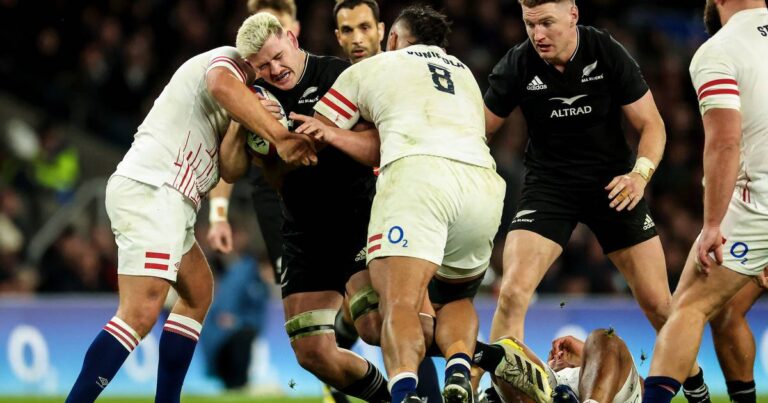
An All Blacks’ season which began with Ireland exposing their physical, technical and mental deficiencies in a home series defeat has finished with a whimper at Twickenham where they couldn’t close out the game against England.
Progress? Maybe, maybe not.
:quality(70):focal(-5x-5:5x5)/cloudfront-ap-southeast-2.images.arcpublishing.com/tvnz/5FEFFRCWDJA2BNNNUCAYMTQHGU.jpg)
At least the All Blacks fronted physically (for 71 minutes, anyway), and the remarkable thing about their start in their final Test of the year was that it mirrored England’s performance against them in the World Cup semifinal three years ago.
They were direct, as England were in Yokohama. They won the collisions and therefore created the space. Their scrum and driving maul – the latter cruelly exposed by Ireland – looked increasingly like weapons and England appeared shocked at the visitors’ intensity and physicality, as did the All Blacks in 2019.
In this respect, the All Blacks showed definite improvements.
But, if anything, England’s early lacklustre performance at Twickenham and New Zealand’s meltdown from 25-6 to 25-all in the final nine minutes following Beauden Barrett’s sinbinning confirmed an ongoing vibe of this month’s internationals – that France and Ireland remain a step or two ahead of the next tier of South Africa, New Zealand, England, Argentina and perhaps Scotland less than 10 months out from the World Cup.
The All Blacks may have fixed their set piece – although the lineout isn’t as consistent as they’d like it to be – driving maul and an apparent lack of an attacking strategy (their wide cross-kick plan against an England side clearly worried about the midfield threat of Jordie Barrett had their opponents bamboozled), but the mental fragility remains.
They needed two attempts to beat South Africa and Argentina in the Rugby Championship – their success in that competition owing much to their dramatic escape in Melbourne after they let slip an 18-point lead against the Wallabies.
Sound familiar?
And it’s here that they are probably most vulnerable as they prepare to kick off against France in Paris on September 9 NZT.
Ian Foster’s remarkable recent confession that the All Blacks weren’t physically or mentally ready for the Irish series back in July could possibly be explained away to an extent by the dismissals of previous assistants John Plumtree and Brad Mooar, with Jason Ryan making immediate improvements and Joe Schmidt’s role given a greater scope.
But, conversely, it’s where they could make the most gains.
:quality(70):focal(-5x-5:5x5)/cloudfront-ap-southeast-2.images.arcpublishing.com/tvnz/4PHD2J36ABHJDAEVKPSZ5MAVKE.jpg)
Anyone who has caught even a glimpse of Richie McCaw’s Chasing Great movie should grasp the importance of the psychological side of the game.
The man acknowledged as probably the greatest All Black and one of the best ever to play the game made no bones about how the All Blacks responded to their 2007 World Cup exit to win the next two editions in New Zealand and the United Kingdom.
“Being able to perform when it really, really counts – that’s the bit that became a big challenge for me,” he says in the film.
And for “challenge”, read “obsession”.
The All Blacks showed remarkable grit and determination to fight back in the final moments and beat the Springboks in Johannesburg.
A week later they lost to the Pumas in Christchurch before they demolished them in Hamilton.
They should have lost to Australia in Melbourne, but for Mathieu Raynal’s late intervention, but were nearly complete against the Wallabies at Eden Park.
And, this month, they flirted with defeat against Japan in Tokyo and were in similar trouble against Scotland in Edinburgh.
Their big win over Wales in Cardiff should perhaps be tempered with Wales’ result a fortnight later, again on home soil, when Wayne Pivac’s men lost 13-12 to Georgia.
Looking back, it was an eccentric run of results perhaps highlighting the smaller margins present in the modern world game but which definitely revealed the All Blacks’ alarming inability to make sound decisions while under the greatest pressure. For eight or so years leading up to the 2019 World Cup it was one of their greatest strengths.
Foster, by accident or design, has found a gem in the form of Jordie Barrett at second-five and polished others in prop Tyrel Lomax, hooker Samisoni Taukei’aho and, potentially, right wing Mark Telea. Dalton Papali’i was a big success story as Sam Cane’s replacement due to his energy and attacking threat.
Their first 70 minutes at Twickenham appeared to show they have the required physical and technical talent.
But the England result reinforced the suspicion that their greatest weakness remains their mental game. McCaw, through shear bloody-mindedness, helped the All Blacks turn that flaw into a strength in 2011 and 2015.
The question is, do the All Blacks have within their wider squad and management group the personnel, and personalities, to do that same?
We’ll see soon enough.